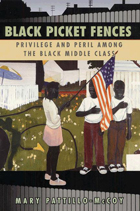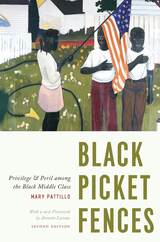3 books about Privilege (Social psychology)

Black Picket Fences
Privilege and Peril among the Black Middle Class
Mary Pattillo-McCoy
University of Chicago Press, 1999
Black Picket Fences is a stark, moving, and candid look at a section of America that is too often ignored by both scholars and the media: the black middle class. The result of living for three years in "Groveland," a black middle-class neighborhood on Chicago's South Side, sociologist Mary Pattillo-McCoy has written a book that explores both the advantages and the boundaries that exist for members of the black middle class. Despite arguments that race no longer matters, Pattillo-McCoy shows a different reality, one where black and white middle classes remain separate and unequal.
"An insightful look at the socio-economic experiences of the black middle class. . . . Through the prism of a South Side Chicago neighborhood, the author shows the distinctly different reality middle-class blacks face as opposed to middle-class whites." —Ebony
"A detailed and well-written account of one neighborhood's struggle to remain a haven of stability and prosperity in the midst of the cyclone that is the American economy." —Emerge
"An insightful look at the socio-economic experiences of the black middle class. . . . Through the prism of a South Side Chicago neighborhood, the author shows the distinctly different reality middle-class blacks face as opposed to middle-class whites." —Ebony
"A detailed and well-written account of one neighborhood's struggle to remain a haven of stability and prosperity in the midst of the cyclone that is the American economy." —Emerge
[more]

Black Picket Fences, Second Edition
Privilege and Peril among the Black Middle Class
Mary Pattillo
University of Chicago Press, 2013
First published in 1999, Mary Pattillo’s Black Picket Fences explores an American demographic group too often ignored by both scholars and the media: the black middle class. Nearly fifteen years later, this book remains a groundbreaking study of a group still underrepresented in the academic and public spheres. The result of living for three years in “Groveland,” a black middle-class neighborhood on Chicago’s South Side, Black Picket Fences explored both the advantages the black middle class has and the boundaries they still face. Despite arguments that race no longer matters, Pattillo showed a different reality, one where black and white middle classes remain separate and unequal.
Stark, moving, and still timely, the book is updated for this edition with a new epilogue by the author that details how the neighborhood and its residents fared in the recession of 2008, as well as new interviews with many of the same neighborhood residents featured in the original. Also included is a new foreword by acclaimed University of Pennsylvania sociologist Annette Lareau.
[more]

Parenting Empires
Class, Whiteness, and the Moral Economy of Privilege in Latin America
Ana Yolanda Ramos-Zayas
Duke University Press, 2020
In Parenting Empires, Ana Y. Ramos-Zayas focuses on the parenting practices of Latin American urban elites to analyze how everyday experiences of whiteness, privilege, and inequality reinforce national and hemispheric idioms of anti-corruption and austerity. Ramos-Zayas shows that for upper-class residents in the affluent neighborhoods of Ipanema (Rio de Janeiro) and El Condado (San Juan), parenting is particularly effective in providing moral grounding for neoliberal projects that disadvantage the overwhelmingly poor and racialized people who care for and teach their children. Wealthy parents in Ipanema and El Condado cultivate a liberal cosmopolitanism by living in multicultural city neighborhoods rather than gated suburban communities. Yet as Ramos-Zayas reveals, their parenting strategies, which stress spirituality, empathy, and equality, allow them to preserve and reproduce their white privilege. Defining this moral economy as “parenting empires,” she sheds light on how child-rearing practices permit urban elites in the Global South to sustain and profit from entrenched social and racial hierarchies.
[more]
READERS
Browse our collection.
PUBLISHERS
See BiblioVault's publisher services.
STUDENT SERVICES
Files for college accessibility offices.
UChicago Accessibility Resources
home | accessibility | search | about | contact us
BiblioVault ® 2001 - 2024
The University of Chicago Press









